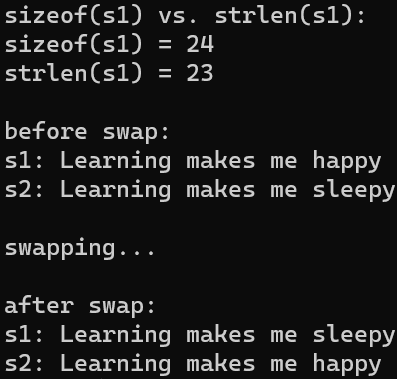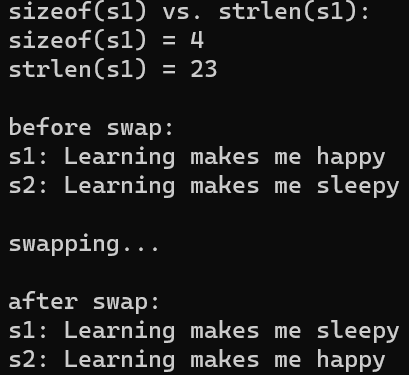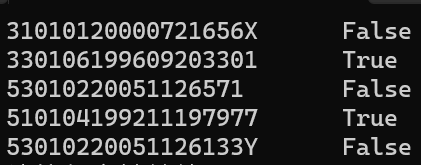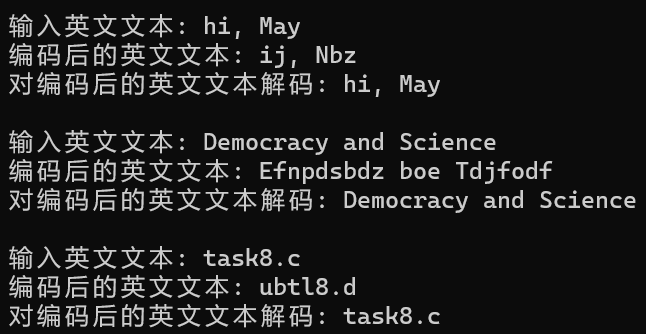五月四日实验
实验一
task1.1
#include <stdio.h> #define N 4 int main() { int x[N] = {1, 9, 8, 4}; int i; int *p; // 方式1:通过数组名和下标遍历输出数组元素 for (i = 0; i < N; ++i) printf("%d", x[i]); printf("\n"); // 方式2:通过指针变量遍历输出数组元素 (写法1) for (p = x; p < x + N; ++p) printf("%d", *p); printf("\n"); // 方式2:通过指针变量遍历输出数组元素(写法2) p = x; for (i = 0; i < N; ++i) printf("%d", *(p + i)); printf("\n"); // 方式2:通过指针变量遍历输出数组元素(写法3) p = x; for (i = 0; i < N; ++i) printf("%d", p[i]); printf("\n"); return 0; }
实验图片:
task1.2
#include <stdio.h> int main() { int x[2][4] = {{1, 9, 8, 4}, {2, 0, 4, 9}}; int i, j; int *p; // 指针变量,存放int类型数据的地址 int(*q)[4]; // 指针变量,指向包含4个int型元素的一维数组 // 使用数组名、下标访问二维数组元素 for (i = 0; i < 2; ++i) { for (j = 0; j < 4; ++j) printf("%d", x[i][j]); printf("\n"); } // 使用指针变量p间接访问二维数组元素 for (p = &x[0][0], i = 0; p < &x[0][0] + 8; ++p, ++i) { printf("%d", *p); if ((i + 1) % 4 == 0) printf("\n"); } // 使用指针变量q间接访问二维数组元素 for(q = x; q < x + 2; q++) { for(j = 0; j < 4; j++) printf("%d", *(*q + j)); printf("\n"); } return 0; }
实验图片:
实验二
task2.1
#include <stdio.h> #include <string.h> #define N 80 int main() { char s1[] = "Learning makes me happy"; char s2[] = "Learning makes me sleepy"; char tmp[N]; printf("sizeof(s1) vs. strlen(s1): \n"); printf("sizeof(s1) = %d\n", sizeof(s1)); printf("strlen(s1) = %d\n", strlen(s1)); printf("\nbefore swap: \n"); printf("s1: %s\n", s1); printf("s2: %s\n", s2); printf("\nswapping...\n"); strcpy(tmp, s1); strcpy(s1, s2); strcpy(s2, tmp); printf("\nafter swap: \n"); printf("s1: %s\n", s1); printf("s2: %s\n", s2); return 0; }
实验图片:
问题1回答:数组s1大小为24字节;sizeof(s1)计算的是数组总共占用空间;strlen(s1)统计的是数组有效部分占用空间。
问题2回答:line7行代码不可替换为“char s1[];s1 = "Learning makes me happy";”,理由是: s1作为地址常量不能存在与等式左侧。
问题3回答:line20~line22执行后,字符数组s1和s2中的内容交换。
task2.2
#include <stdio.h> #include <string.h> #define N 80 int main() { char *s1; s1 = "Learning makes me happy"; char *s2 = "Learning makes me sleepy"; char *tmp; printf("sizeof(s1) vs. strlen(s1): \n"); printf("sizeof(s1) = %d\n", sizeof(s1)); printf("strlen(s1) = %d\n", strlen(s1)); printf("\nbefore swap: \n"); printf("s1: %s\n", s1); printf("s2: %s\n", s2); printf("\nswapping...\n"); tmp = s1; s1 = s2; s2 = tmp; printf("\nafter swap: \n"); printf("s1: %s\n", s1); printf("s2: %s\n", s2); return 0; }
实验图片:
问题1回答:指针变量s1中存放的是字符串的地址;sizeof(s1)计算的是字符串的地址占用的空间;strlen(s1)统计的是字符串的有效部分占用的空间。
问题2回答:ine7代码能替换成“char *s1;s1 = "Learning makes me happy";”的写法;经过对比,task2.2中是将字符串的地址赋予地址变量,而task2.1中等式左侧是地址常量,故2不可。
问题3回答:line20~line22交换的是两字符串的地址;两字符串的在内存中的储存单元没有交换。
实验三
#include <stdio.h> void str_cpy(char *target, const char *source); void str_cat(char *str1, char *str2); int main() { char s1[80], s2[20] = "1984"; str_cpy(s1, s2); puts(s1); str_cat(s1, " Animal Farm"); puts(s1); return 0; } void str_cpy(char *target, const char *source) { while (*target++ = *source++) ; } void str_cat(char *str1, char *str2) { while (*str1) str1++; while (*str1++ = *str2++) ; }
实验图片:
实验四
#include <stdio.h> #define N 80 int func(char *); int main() { char str[80]; while (gets(str) != NULL) { if (func(str)) printf("yes\n"); else printf("no\n"); } return 0; } int func(char *str) { char *begin, *end; begin = end = str; while (*end) end++; end--; while (begin < end) { if (*begin != *end) return 0; else { begin++; end--; } } return 1; }
实验图片:
实验五
#include <stdio.h> #define N 80 void func(char *); int main() { char s[N]; while (scanf("%s", s) != EOF) { func(s); puts(s); } return 0; } void func(char *str) { int i; char *p1, *p2, *p; p1 = str; while (*p1 == '*') p1++; p2 = str; while (*p2) p2++; p2--; while (*p2 == '*') p2--; p = str; i = 0; while (p < p1) { str[i] = *p; p++; i++; } while (p <= p2) { if (*p != '*') { str[i] = *p; i++; } p++; } while (*p != '\0') { str[i] = *p; p++; i++; } str[i] = '\0'; }
实验图片:
实验六
task6.1
//#include <stdio.h> //#include <string.h> //void sort(char *name[], int n); //int main() //{ //char *course[4] = {"C Program", //"C++ Object Oriented Program", //"Operating System", //"Data Structure and Algorithms"}; //int i; //sort(course, 4); //for (i = 0; i < 4; i++) //printf("%s\n", course[i]); //return 0; //} //void sort(char *name[], int n) //{ //int i, j; //char *tmp; //for (i = 0; i < n - 1; ++i) //for (j = 0; j < n - 1 - i; ++j) //if (strcmp(name[j], name[j + 1]) > 0) //{ //tmp = name[j]; //name[j] = name[j + 1]; //name[j + 1] = tmp; //} //}
实验图片:
task6.2
#include <stdio.h> #include <string.h> void sort(char *name[], int n); int main() { char *course[4] = {"C Program", "C++ Object Oriented Program", "Operating System", "Data Structure and Algorithms"}; int i; sort(course, 4); for (i = 0; i < 4; i++) printf("%s\n", course[i]); return 0; } void sort(char *name[], int n) { int i, j, k; char *tmp; for (i = 0; i < n - 1; i++) { k = i; for (j = i + 1; j < n; j++) if (strcmp(name[j], name[k]) < 0) k = j; if (k != i) { tmp = name[i]; name[i] = name[k]; name[k] = tmp; } } }
实验图片:
问题回答:这两种算法实现中,交换的是指针变量的值。
实验七
#include <stdio.h> #include <string.h> #define N 5 int check_id(char *str); int main() { char *pid[N] = {"31010120000721656X", "330106199609203301", "53010220051126571", "510104199211197977", "53010220051126133Y"}; int i; for(i = 0; i < N; ++i) { if(check_id(pid[i])) printf("%s\tTrue\n", pid[i]); else printf("%s\tFalse\n", pid[i]); } return 0; } int check_id(char *str) { char *p; int i; p = str; while(*p >= '0' && *p <= '9') p++; if(*p == '\0' && strlen(str) == 18) return 1; else return 0; }
实验图片:
实验八
#include <stdio.h> #define N 80 void encoder(char *s); // 函数声明 void decoder(char *s); // 函数声明 int main() { char words[N]; printf("输入英文文本: "); while(gets(words) != NULL) { printf("编码后的英文文本: "); encoder(words); // 函数调用 printf("%s\n", words); printf("对编码后的英文文本解码: "); decoder(words); // 函数调用 printf("%s\n\n", words); printf("输入英文文本: "); } return 0; } void encoder(char *s) { while(*s) { if(*s >= 'a' && *s <= 'y' || *s >= 'A' && *s <= 'Y') { *s = *s + 1; s++; continue; } else if(*s == 'z' || *s == 'Z') { *s = *s - 25; s++; continue; } s++; } return; } void decoder(char *s) { while(*s) { if(*s >= 'b' && *s <= 'z' || *s >= 'B' && *s <= 'Z') { *s = *s - 1; s++; continue; } else if(*s == 'a' || *s == 'A') { *s = *s + 25; s++; continue; } s++; } return; }
实验图片:



 浙公网安备 33010602011771号
浙公网安备 33010602011771号